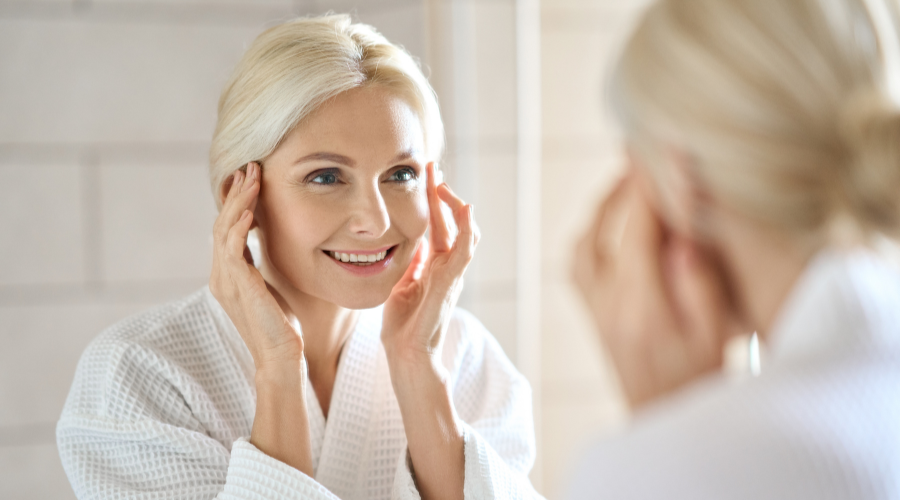Unveiling the Ageing of the Face: Exploring Skin Changes During Menopause

The menopausal transition brings about a cascade of changes in a woman’s body due to the decline in oestrogen levels. While hot flushes and night sweats are commonly discussed symptoms, the impact on the skin is often overlooked.
In this blog post, we will delve into the effects of menopause on skin quality and explore the role of hormone replacement therapy (HRT) in maintaining the health of our largest organ, the skin.

The skin’s response to declining oestrogen
The female sex hormone oestrogen has an effect on neurotransmitters in the brain including serotonin (a chemical that boosts mood). Fluctuations in oestrogen can cause premenstrual syndrome (PMS) or depressed mood during the perimenopause (the phase before periods stop completely) and the menopause.
How does this effect us…
Did you know…
In the first five years after menopause, up to a third of dermal collagen may be lost, with an annual ongoing decline of approximately 2.1%. Skin thickness decreases by 1.1% per year and it may become more susceptible to injuries and slower wound healing. The descent of fat compartments in the cheeks contributes to the development of marionette lines and jowls, leading to a more saggy appearance.

Factors that influence the ageing of the face
Facial ageing is influenced by both intrinsic and extrinsic factors. Extrinsic factors, such as UV exposure and smoking, can be preventable causes of skin damage. Sunlight, for instance, leads to photodamage, manifesting as pigmentation and fine wrinkles. Smoking, on the other hand, accelerates the loss of skin elasticity by damaging collagen.
Intrinsic factors like sleep deprivation also play a role. Women in the perimenopause often experience sleeping difficulties, which can lead to accelerated ageing. Lack of sleep increases DNA damage, hampers DNA repair, and heightens inflammation, impacting overall skin health.

HRT and its impact on the skin
As a medical professional specializing in both Menopause and Aesthetic Medicine, I am intrigued by the findings indicating that facial bone structure is lost as we grow older, leading to noticeable alterations in the soft tissue affecting the appearance of the face and neck.
Bioidentical HRT, containing regulated 17 beta-oestradiol and micronized progesterone, offers multiple benefits, including improved quality of life and sleep, maintenance of bone mass, and a reduced risk of fractures associated with osteoporosis. Oestrogen beta receptors are expressed in skin cells, however, they decline during the menopause.
Did you know…
Oestrogen helps protect against oxidative damage and stimulates the synthesis of elastic fibers, collagen type II, and hyaluronic acid. These effects contribute to maintaining skin elasticity and hydration.

Caring for your skin during menopause
To counter the skin changes associated with menopause, adopting a proactive skincare routine is essential. Start by diligently protecting your skin from UV damage by using a good sunscreen with high UVA and UVB protection. Additionally, maintaining a low-sugar diet can help slow down collagen loss and provide long-term metabolic benefits.
If you are a smoker, smoking cessation can prevent further damage to the skin, particularly around the mouth area. Skin boosters can also provide hydration and dermal fillers can restore lost volume caused by the descent of fat pads.
Addressing perimenopausal symptoms
If you’re experiencing perimenopausal symptoms such as hot flushes, night sweats and sleeping difficulties, it is advisable to consult with a doctor. They can discuss the benefits and potential risks of bioidentical hormone replacement therapy and determine whether it is a suitable option for you.
It is important to consider whether your body can produce adequate amounts of vitamin D when using high sun protection or if you need to supplement it. We can provide a blood test to check your vitamin D levels. A DEXA scan can be conducted to assess the bone health of your hip and spine.
As women navigate through the menopausal transition, understanding the changes that occur in the skin becomes crucial. By recognising the impact of declining oestrogen and adopting appropriate skincare practices, women can mitigate the impact of the menopause on their skin. Staying hydrated, protecting the skin from sun damage and leading a healthy lifestyle are essential steps in maintaining healthy and radiant skin during this transitional phase.
This article was written by Hormone Health Associate Dr Liz McCulloch